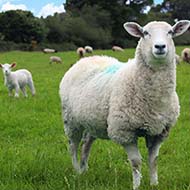
The charity is supporting Sheep Worrying Week.
The RSPCA is reminding pet owners to keep their dog on a lead around livestock as attacks on sheep continue across the UK.
The charity reports shocking incidents of sheep being injured or even killed by dogs which were off the lead, including a sheep badly injured in Burnley last March.
Holly Gower, RSPCA farm animal welfare expert for cattle, sheep and goats, said: “Whilst you might think there is no harm done if your dog momentarily chases livestock and comes back quickly without injuring them, being chased by a dog causes the animal stress and anxiety.
“This can cause lots of problems for farmed animals - and even lead to pregnancy loss, which is particularly tragic. Sheep are most likely to be impacted by livestock worrying and as a prey species this can cause significant distress for them.”
The plea from the RSPCA comes as the National Sheep Association (NSA) begins its annual sheep worrying by dogs awareness week (14- 20 April), and shares its annual survey on the scale and impact of the issue.
It reveals 87 per cent of farmer respondents experienced a dog attack on their flock in the last 12 months, most likely caused by the refusal of owners to keep their pet on a lead whilst walking in the countryside.
Respondents to the survey also reported an average of four sheep deaths per year owing to sheep worrying by dogs. This is an increase from previous years and does not factor in the additional losses from miscarriage due to stress from attacks, the NSA said.
Interestingly, the survey also found that the majority of worrying incidents occur when dogs have escaped from a garden and their owners aren’t around.
NSA project manager, Nicola Noble, said: “Sheep worrying by dogs not only causes suffering to livestock but is also a real cause of stress and worry to farmers. Farmers have reported in this and previous surveys that their mental wellbeing has been compromised by the continued threat to their animals.
“A high proportion (80%) of survey respondents also reported a negative experience when approaching dog owners to ask for their dog to be put on a lead with just under half receiving verbal and, in some cases, even physical abuse.”
Image (C) Shutterstock.



 The Veterinary Medicines Directorate (VMD) is inviting applications from veterinary students to attend a one-week extramural studies (EMS) placement in July 2026.
The Veterinary Medicines Directorate (VMD) is inviting applications from veterinary students to attend a one-week extramural studies (EMS) placement in July 2026.